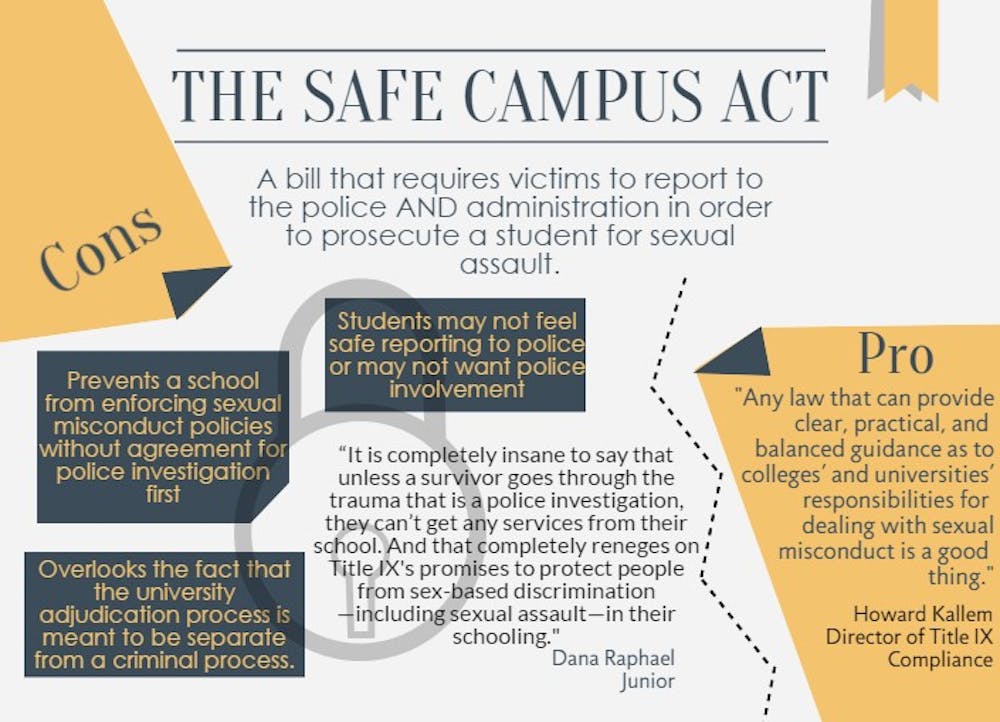The Safe Campus Act—a federal bill put forth in the House of Representatives to address sexual violence on college campuses—has raised discussion among Duke faculty and students.
There are currently several proposed bills in Congress that deal with sexual misconduct, including the Campus Accountability and Safety Act, the Safe Campus Act and the Fair Campus Act. The Safe Campus Act—which requires that victims report to the police and administration in order to prosecute a student for sexual assault—has created controversy on many college campuses, including at Duke. Several administrators and students have voiced their opinion amid the debate surrounding the bill.
“The Safe Campus Act would prevent a school from enforcing its policies on sexual misconduct unless the reporting student agrees to a police investigation,” wrote Howard Kallem, director of Title IX compliance at Duke, in an email.
Even then, only once the police department notifies the school of the student’s report can the case proceed.
Kallem noted that the federal Violence Against Women Act, in place since 1994, recognizes that a student may not want to involve the police in certain situations and requires that students be made aware of their right to file or not file a police report.
In addition, the Safe Campus Act imposes due process requirements for sexual misconduct proceedings. These requirements, Kallem noted, tend to focus the bill on the responding party rather than the reporting victim.
“For example, [the Safe Campus Act] requires schools to provide responding parties with the opportunity to ‘safely confront witnesses, including the complainant,’ without requiring a similar opportunity for reporting parties, and it provides for judicial review of a school’s decision for the responding party but not for the reporting party/complainant,” Kallem wrote.
Junior Dana Raphael, who is a columnist for The Chronicle, expanded on the potential limitations of the Act, highlighting that the Safe Campus Act overlooks the fact that the university adjudication process is meant to be distinct from criminal proceedings.
For instance, Raphael gave the example that in North Carolina, anal rape does not legally qualify as rape, but at Duke, it is qualified as rape under the University’s sexual misconduct policy.
“It is completely insane to say that unless a survivor goes through the trauma that is a police investigation, they can’t get any services from their school,” Raphael wrote in an email. “That completely reneges on Title IX’s promises to protect people from sex-based discrimination—including sexual assault—in their schooling.”
Title IX entails that colleges and universities have an independent obligation to deal with sexual misconduct in a timely fashion regardless of whether a police investigation occurs.
“Title IX also states that a criminal investigation into allegations of sexual violence does not substitute the school’s duty to respond to complaints promptly and equitably,” Kallem wrote, adding that police and prosecutors use different legal reasonings to decide whether or not to investigate.
“In the meantime, the reporting and responding students may be sitting in the same classroom, living in the same dormitory, going to the same dining hall,” Kallem wrote. “Schools want to have a safe environment for all their students, including one that is free from discrimination and harassment.”
Another concern about the Safe Campus Act is that students may not feel safe reporting to police or may not want police involvement, Kallen explained. He added that the Act’s requirement for the school to notify police before conducting an investigation could discourage students from reporting to the school in the first place.
Freshman Rohan Rajan said the Safe Campus Act does not appear to be applicable to different situations. For example, there are more clear-cut cases—which may not require DNA evidence or other tests—and less clear-cut cases that might need thorough police investigation, he explained.
Kallem, however, noted that although not everyone may agree with the bill’s implementation, the Safe Campus Act and the other bills currently in Congress represent a real federal effort to provide clearer guidelines for colleges and universities in dealing with sexual violence.
“Any law that can provide clear, practical and balanced guidance as to colleges’ and universities’ responsibilities for dealing with sexual misconduct is a good thing,” Kallem wrote.
As for the potential impact of the Safe Campus Act on Greek life, Clarybel Peguero, assistant dean of fraternity and sorority life, wrote in an email that students in the Greek system “are Duke students first and foremost” and would not be treated differently from any other student.
Get The Chronicle straight to your inbox
Signup for our weekly newsletter. Cancel at any time.

